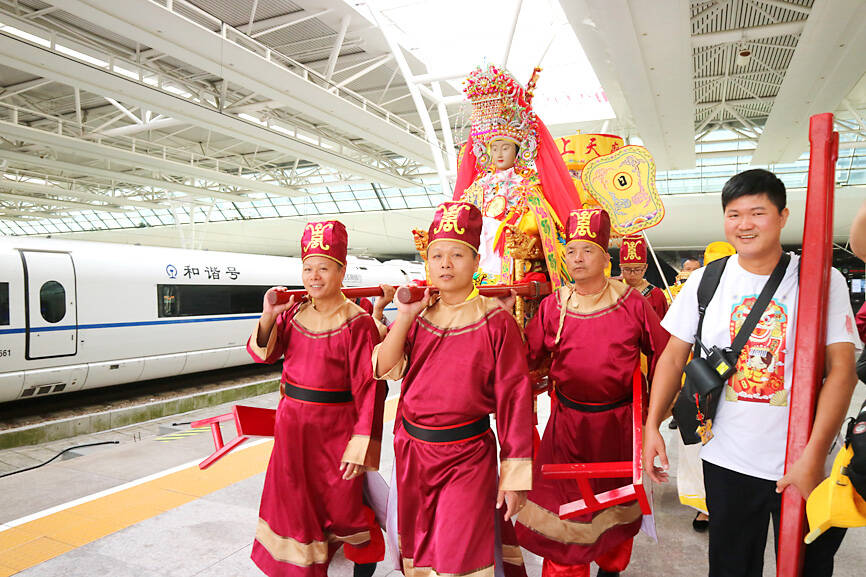Chinese who had sought to enter Taiwan for a religious event were not granted visas because they were not “religious personnel” and planned to visit places not listed on their group tour’s itinerary, then never supplied supplemental information upon request, the Ministry of the Interior and the Mainland Affairs Council (MAC) said yesterday.
Visas were not issued for 218 of the 239 applicants, as they did not provide additional information or explanations as requested, Minister of the Interior Lin Yu-chang (林右昌) told a committee at the legislature in Taipei.
Multiple groups, including the Taiwan Matsu Fellowship, had signed a petition that sought permission to bring a statue of Matsu from Meizhou Island in China’s Fujian Province to tour Taiwan.

Photo: CNA
The temple was quick to respond and arranged for a visit from Nov. 3 to 13.
China’s Taiwan Affairs Office (TAO) on Wednesday accused the Democratic Progressive Party (DPP) of making an “arbitrary” decision to reject visa applications out of malice.
TAO spokesman Chen Binhua (陳斌華) asked why an application by Hui Ju Matsu Temple in China’s Jiangsu Province was approved, while the Meizhou temple’s application was denied.
The ministry said it had asked visa applicants to prove that they were not affiliated with the Chinese Communist Party (CCP), the Chinese People’s Liberation Army or the Chinese government, as they were not affiliated with the temple.
Separately, MAC Minister Chiu Tai-san (邱太三) also denied claims that the ministry had wrongly denied visa applications.
The ministry has stated that the documents submitted were incomplete or erroneous, and it asked the temple to submit further information and details about the trip, Chiu said.
Agencies on both sides are familiar with the process, which is the same as when religious interaction across the Taiwan Strait was more frequent, he said.
Chiu urged the CCP to refrain from using religion as a tool to advance its “unified front” rhetoric while also promoting a secular worldview, adding that devout Taiwanese would not believe such politically motivated accusations.
At the International Conference on the Chinese Path to Modernization under One-Party Rule forum at the Shangri La Far Eastern Hotel in Taipei later yesterday, Chiu called on Beijing to live up to its obligations as a great power, maintain peace and stability in the international community, and cease its threats against Taiwan.
If China’s claims to foster “modern socialism with Chinese characteristics” and its plans to promote “common prosperity” fail to guarantee fundamental human rights, a free and democratic way of life, and a higher standard of living for its citizens, its claims are only propaganda to prop up its autocratic government, he said.
Beijing should uphold global peace, which is the only way for it to be genuinely respected by the international community, he added.

Hong Kong-based American singer-songwriter Khalil Fong (方大同) has passed away at the age of 41, Fong’s record label confirmed yesterday. “With unwavering optimism in the face of a relentless illness for five years, Khalil Fong gently and gracefully bid farewell to this world on the morning of February 21, 2025, stepping into the next realm of existence to carry forward his purpose and dreams,” Fu Music wrote on the company’s official Facebook page. “The music and graphic novels he gifted to the world remain an eternal testament to his luminous spirit, a timeless treasure for generations to come,” it said. Although Fong’s

China’s military buildup in the southern portion of the first island chain poses a serious threat to Taiwan’s liquefied natural gas (LNG) supply, a defense analyst warned. Writing in a bulletin on the National Defense and Security Research’s Web site on Thursday, Huang Tsung-ting (黃宗鼎) said that China might choke off Taiwan’s energy supply without it. Beginning last year, China entrenched its position in the southern region of the first island chain, often with Russia’s active support, he said. In May of the same year, a Chinese People’s Liberation Army Navy (PLAN) force consisting of a Type 054A destroyer, Type 055 destroyer,

Actor Darren Wang (王大陸) was questioned by prosecutors for allegedly orchestrating an attack on a taxi driver after he was allegedly driven on a longer than necessary route in a car he disliked. The questioning at the New Taipei City District Prosecutors’ Office was ongoing as of press time last night. Police have recommended charges of attempted murder. The legally embattled actor — known for his role in the coming-of-age film Our Times (我的少女時代) — is under a separate investigation for allegedly using fake medical documents to evade mandatory military service. According to local media reports, police said Wang earlier last year ordered a

Taiwan is planning to expand the use of artificial intelligence (AI)-based X-ray imaging to customs clearance points over the next four years to curb the smuggling of contraband, a Customs Administration official said. The official on condition of anonymity said the plan would cover meat products, e-cigarettes and heated tobacco products, large bundles of banknotes and certain agricultural produce. Taiwan began using AI image recognition systems in July 2021. This year, generative AI — a subset of AI which uses generative models to produce data — would be used to train AI models to produce realistic X-ray images of contraband, the official